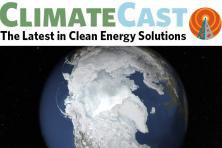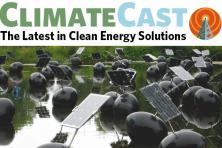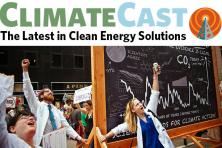Solar resiliency
Solar power is not only cheap, clean and plentiful -- it’s resilient. From climate disasters like Hurricane Maria in Puerto Rico, to remote villages with limited access to electricity, people across the globe are experiencing how well solar provides power in places where unreliable grids, natural disasters, and other barriers have previously left them in the dark. Recent headlines show that solar is increasingly being viewed as a viable source of decentralized power; it’s an easily distributed resource that can restore and maintain power for communities in the wake of natural disasters, and ensure that first responders have the vital electricity needed to save lives.
A completely clean power grid? It’s within reach.
New research commissioned by Climate Solutions shows that powering the Pacific Northwest on 100 percent renewable energy is not only possible, but practical. The research shows that a fossil-free electrical grid will provide clean, reliable, and affordable power. It also shows that Washington State has more than one pathway it can pursue to safely and effectively transition to a clean power grid. In Oregon, the state’s Public Utility Commission submitted a report to the State Legislature recommending strategies for the electricity sector to rapidly reduce greenhouse gases and address equity.
While the Pacific Northwest investigates ways to transition to a cleaner power grid, other jurisdictions are already nearly there. Wind energy is predicted to become Europe’s top energy source within a decade -- by the year 2027.
Climate action: on the ballot this November
The election is less than a month away, and climate action is on the ballot, from candidate priorities, to state and city ballot measures. With 36 governorships appearing on this year’s ballots, clean energy advocates hope to win big and help their states become climate leaders. Nationwide, 64 citizen-driven ballot initiatives will be voted on, including many aimed at reducing states’ reliance on fossil fuels and increasing their transition to renewable energy. In the Pacific Northwest, Washington State’s I-1631 would put a price on carbon emissions from the largest polluters, while Portland’s Clean Energy Fund would raise more than $30 million annually for clean energy projects by putting a one percent tax on certain large corporations doing business in Portland.
Why all of this matters so much
The UN International Panel on Climate Change released a report that only “drastic and immediate change” can prevent disastrous levels of climate change. More than 90 authors from 40 countries lead the report, combining current understanding of the scientific community on climate change and citing more than 6,000 peer-reviewed scientific articles and studies. Another report found that climate change will cost the U.S. more in economic damage than any other country in the world except for India. U.S. national parks also stand to suffer a great deal from the effects of climate change. By 2100, temperatures in some national parks could rise as much as 16 degrees and cause the extinction of many small animal and plant species who live within the parks.
The Trump administration released a 500-page environmental impact statement concluding that on our current course, the planet will warm seven degrees by the end of this century. Despite climate disaster as outlined in the report, the report doesn’t call for dramatic action to avoid that catastrophe; rather, it aims “to justify President Trump’s decision to freeze federal fuel-efficiency standards for cars and light trucks built after 2020.” The report’s logic (if the planet is on course to warm so dramatically anyway, why bother trying to stop it?) has led some to wonder whether the US administration has reached Stage Five of climate denial.
Inspiring climate actions and mitigation
As the federal government continues to lag on climate action, so do states and cities continue to lead. Governor Kate Brown of Oregon made headlines when she announced new legislation to make the standards of the federal Clean Air Act and the Clean Water Act into state law -- making them enforceable even if the federal government eliminates them. One of Oregon’s major newspaper editorial boards has also urged the state legislature to pass the Clean Energy Jobs bill in 2019. In Eugene, the legal battle to require the federal government drastically reduce greenhouse gas emissions continues. The lawsuit, brought forth by a group of young climate activists, goes to trial at the U.S. Courthouse in Eugene later this month.
Climate justice is social justice
Black residents in communities in Virginia, Alabama, Pennsylvania, Georgia and Illinois have said their cities have been targeted by polluters in recent years specifically because they have fewer resources to fight back. In many of the cases, state and federal agencies have sided with polluters when challenged. In West Virginia, investigative journalist Ken Ward Jr. was awarded the prestigious MacArthur Foundation award for his in-depth coverage of the coal, chemical and natural gas industries in West Virginia. He helped expose the “true economic, social, and health impacts of industrial abuse on Appalachian residents and communities.” In the Southwest, climate gentrification is becoming a concern as residents from hotter cities like Phoenix and Tucson move to cooler cities like Flagstaff. As those with the means to do so move, property and rental values in the city soar, greatly impacting low-income residents.
In New Orleans, Miami Beach, Houston and Virginia Beach, Americans are already telling their stories of how they had to leave home following climate disaster. In Central America, farmers from the Dry Corridor (a region that stretches from Mexico to Panama) are increasingly fleeing the region for the U.S. border as the region continues to endure one of the worst droughts it has ever experienced.
In brief: mapping environmental insights
Google plans to introduce a new tool to help city planners and local governments fight climate change. Google will provide greenhouse gas emissions data for specific cities -- including releasing previously proprietary data it collects through its apps that can provide insights into a city’s annual driving, biking, and transit ridership. Specific business sectors also continue to spearhead their own adaptation and mitigation efforts.




